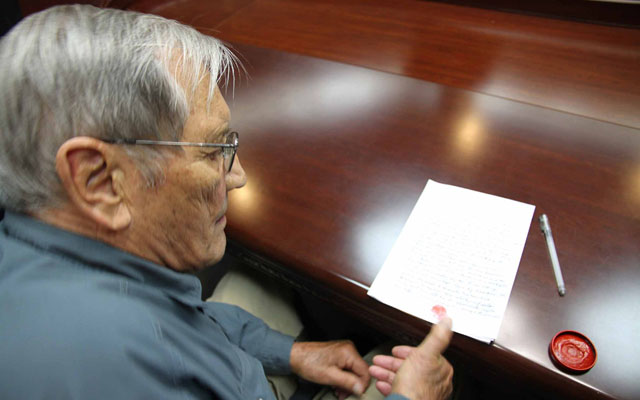North Korea released a video of Merrill Newman, an 85-year-old American citizen, reading a coerced confession for committing “hostile acts” against the regime.
Newman was arrested while about to depart North Korea after a 10-day tourist visit. Newman, who served in the U.S. Army during the Korean War, is seen reading a statement declaring, “I killed so many civilians and [North Korean] soldiers and destroyed strategic objects in [North Korea] during the Korean War. I committed indelible offensive acts against the [North Korean] government and Korean people.”
North Korea accused him of being a “mastermind of clandestine operations” during the war. Pyongyang also took umbrage at Newman’s request to meet with surviving soldiers from his wartime unit or their descendants and to pray for the souls of the dead soldiers. North Korea accused Newman of having infringed upon the “dignity and sovereignty” of the nation.
The Obama Administration responded to the outrage by urging North Korea “to release Mr. Newman so he may return home and reunite with his family. We remain deeply concerned about the welfare of the U.S. citizens held in custody in [North Korea].”
Advocates of engagement with North Korea deride simplistic media reporting depicting the reclusive regime as “strange.” They assert that diplomacy can resolve Pyongyang’s long-standing quest for nuclear weapons. Increased social interaction (such as tourism, student exchanges, and philharmonic orchestra visits) will, it is argued, enhance mutual understanding and lower distrust.
Sorry, but arresting an elderly tourist as a security threat and forcing him to sign a confession for being a soldier 60 years ago seems nothing else but “strange.” Pyongyang has not only set back any inkling of U.S. interest in resuming nuclear negotiations; it has also affirmed every negative impression anyone harbored about the North Korean dictatorship.
North Korea has arrested Americans before—mostly journalists attempting to sneak into the country or missionaries proselytizing against Pyongyang’s repression of religious freedom. But arresting someone for being a tourist is a first.
Perhaps the only thing more pitiful than North Korea’s outrageous actions is Washington’s timid response. One might have hoped that seeing a U.S. citizen—one who served his country in wartime—humiliated and forced to bow to his captors after signing a trumped-up confession would have elicited a more outraged response than “deeply concerned.”
Photos of Merrill Newman bowing conjures up similar images of Americans held captive after the USS Pueblo was captured by North Korea in 1968. The Pueblo, an unarmed reconnaissance ship captured in international waters—officially remains a commissioned vessel of the U.S. Navy—the only one held by enemy combatants.
It is not known whether North Korea will release Newman or under what conditions. Another American, Kenneth Bae, was sentenced last year to 15 years of hard labor for “hostile acts against the republic.” Pyongyang might seek to use Newman’s capture to push for a peace treaty to formally end the Korean War. The regime has called for replacing the current armistice after previous incidents that raised tensions on the Korean Peninsula.
The Obama Administration should condition any resumptions of diplomatic engagement or consideration of aid on the release of Newman and Bae. Any negotiations on a Korean War peace treaty should include a reduction in the North Korean conventional force threat to South Korea, implementation of confidence-building measures, and the return of the USS Pueblo.






























